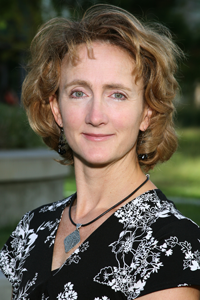
Two groups of Colorado breast cancer researchers have received a total $1.625 million in grants to better understand the role of stem-like breast cancer cells in treatment resistance and recurrence.
University of Colorado Cancer Center researcher Carol Sartorius, PhD, received a $1.25 million grant from the NCI to investigate the role of stem-like cells in estrogen receptor-positive (ER+) breast cancer. Sartorius, associate professor of endocrinology at the University of Colorado School of Medicine (SOM), was the first person to show that the hormone progesterone regulates a stem-like cell phenotype in breast cancer.
In a July 28, 2010 paper in Breast Cancer Research Treatment, Sartorius and UCCC breast-cancer researcher and clinician Peter Kabos, MD, assistant professor of medical oncology at the SOM, identified a pool of cells that lose both estrogen and progesterone receptors and gain expression of the protein cytokeratin 5. They showed that cells expressing cytokeratin 5 tend to survive treatment and endocrine therapy—a hallmark of stem-like cells.
“Most of the markers for stem-like cells in breast cancer are more prevalent in triple-negative tumors, which have lost their progesterone and estrogen receptors and are negative for the HER2 protein,” Sartorius says. “The cells that express cytokeratin 5 tend to show up in ER+ breast cancer. We think this protein is a unique marker for cells that are more resistant to treatment in ER+ tumors.”
Sartorius says the grant will allow her to figure out how these cytokeratin 5-expressing cells are regulated in ER+ breast cancer, how they make the tumor more drug-resistant. She will collaborate with UCCC researcher Dan LaBarbara, PhD, assistant professor of pharmaceutical sciences at the University of Colorado School of Pharmacy, to figure out whether the cells can be targeted with novel drugs.
“No one has ever looked at how hormones affect the pool of stem-like cells within breast tumors,” she says. “We think these cells often make up just 1 to 2 percent of ER+ tumors, and they are the ones that survive and cause the cancer to recur.”
Sartorius is also working with UCCC researcher Jennifer Richer, PhD, associate professor of pathology at the SOM, who is an expert in the role of microRNAs in breast cancer. They received a $375,000 Idea Grant from the Department of Defense to narrow down which of a group of microRNAs are involved in changing cells from being differentiated to being stem-like. Kabos will also collaborate on the DOD grant.
“Jennifer has shown that hormone-regulated microRNAs actually suppress the more differentiated genes and allow restoration of factors that will promote a more stem-like phenotype,” says Sartorius, also a member of the Charles C. Gates Center for Regenerative Medicine and Stem Cell Biology. “We’re going to see if we can manipulate expression of several hormone-regulated microRNAs to change stem-like breast cancer cells back into more differentiated cells. If it works, that means we can take a tumor that is more untreatable, deprogram it, and have a better chance of success using known therapies. It’s a lofty goal.”
About the University of Colorado Cancer Center
The University of Colorado Cancer Center is the Rocky Mountain region’s only National Cancer Institute-designated comprehensive cancer center. NCI has given only 40 cancer centers this designation, deeming membership as “the best of the best.” Headquartered on the University of Colorado Denver Anschutz Medical Campus, UCCC is a consortium of three state universities (Colorado State University, University of Colorado at Boulder and University of Colorado Denver) and five institutions (The Children’s Hospital, Denver Health, Denver VA Medical Center, National Jewish Health and University of Colorado Hospital). Together, our 440+ members are working to ease the cancer burden through cancer care, research, education and prevention and control. Learn more at www.uccc.info.
